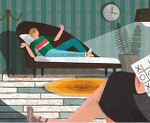 ‘Researchers have found that Cognitive Behavioural Therapy is roughly half as effective in treating depression as it used to be’ writes Oliver Burkeman in The Guardian, arguing that this is why CBT is ‘falling out of favour’. It’s worth saying that CBT seems as popular as ever, but even if it was in decline, it probably wouldn’t be due to diminishing effectiveness – because this sort of reduction in effect is common across a range of treatments.
‘Researchers have found that Cognitive Behavioural Therapy is roughly half as effective in treating depression as it used to be’ writes Oliver Burkeman in The Guardian, arguing that this is why CBT is ‘falling out of favour’. It’s worth saying that CBT seems as popular as ever, but even if it was in decline, it probably wouldn’t be due to diminishing effectiveness – because this sort of reduction in effect is common across a range of treatments.
Burkeman is commenting on a new meta-analysis that reports that more recent trials of CBT for depression find it to be less effective than older trials but this pattern is common as treatments are more thoroughly tested. This has been reported in antipsychotics, antidepressants and treatments for OCD to name but a few.
Interestingly, one commonly cited reason treatments become less effective in trials is because response to placebo is increasing, meaning many treatments seem to lose their relative potency over time.
Counter-intuitively, for something considered to be ‘an inert control condition’ the placebo response is very sensitive to the design of the trial, so even comparing placebo against several rather than one active treatment can affect placebo response.
This has led people to suggest lots of ‘placebo’ hacks. “In clinical trials,” noted one 2013 paper in Drug Discovery, “the placebo effect should be minimized to optimize drug–placebo difference”.
It’s interesting that it is still not entirely clear whether this approach is ‘revealing’ the true effects of the treatment or just another way of ‘spinning’ trials for the increasingly worried pharmaceutical and therapy industries.
The reasons for the declining treatment effects over time are also likely to include different types of patients selected into trials, more methodologically sound research practices meaning less chance of optimistic measuring and reporting, the fact that if chance gives you a falsely inflated treatment effect first time round it is more likely to be re-tested than initially less impressive first trials, and the fact that older known treatments might bring a whole load of expectations with them that brand new treatments don’t.
The bottom line is that lots of our treatments, across medicine as a whole, have quite modest effects when compared to placebo. But if placebo represents an attempt to address the problem, it provides quite a boost to the moderate effects that the treatment itself brings.
So the reports of the death of CBT have been greatly exaggerated but this is mostly due to the fact that lots of treatments start to look less impressive when they’ve been around for a while. This is less due to them ‘losing’ their effect and more likely due to us more accurately measuring their true but more modest effect over time.
It seems like every therapist or psychologist these days claims to practice some version of CBT.
I wonder if: As CBT becomes more popular, and more therapists and psychologists start using it, if the diminishing effects of CBT are in part due to a “least common denominator” effect?
….”Interestingly, one commonly cited reason treatments become less effective in trials is because response to placebo is increasing, meaning many treatments seem to lose their relative potency over time..”<–from the article.
Read that again: "…RESPONSE TO PLACEBO IS INCREASING"…."
Those darn placebos. They're gonna put Pharma out of business, if we're not careful….
Surely poorly tested methods would not always be higher than accurately tested methods!? Your logic doesn’t appear statistically sound.
On average error would be both higher and lower, not always higher.
If the errors in the published literature were truly random you would be correct but the system for producing science tends to be biased towards ‘filtering out’ non-positive findings due to the incentive structures at the individual and institutional levels. So poorer methods typically produce stronger effect sizes for the treatment being tested.
Good discussion and review of the literature here:
http://www.pnas.org/content/110/37/15031.long
Right, yes! I had heard that before. Well said. The fact this filtering occurs almost makes the results of research pointless. Desperation for funding, profits and scientific ego appear to distort the results then? The same is happening in target based jobs. Most people I know fiddle the figures to keep their jobs. It appears we are all living an illusion in this sense. Displeasing to reach this realisation.
Yes, we are all living an illusion. Once you realize it, and accept that fact, you’ll get used to it. It’s still the same screwed-up world it’s always been, except now you KNOW THAT. You’ll get used to it. Remember, it’s all an illusion. It’s only “real” because you *BELIEVE* that it’s real….
(That’s the whole problem with the junk science known as “psychiatry”, and Pharma….
My skepticism of research has been growing for a few years now. I guessed it’s reached its highest point now. Great talking with you.
There are so many potential method issues, it’s hard to really know. One possibility, besides problems with methods, is that the world has moved on yet CBT is still largely treated in the traditional format. There have been more recent efforts to change, such as through fantastic apps like Smiling Mind, but psychology may not be keeping up with changes in culture, technology etc.